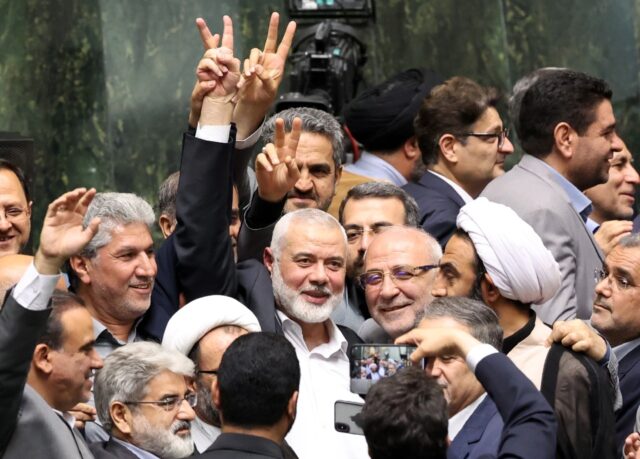The killing of Hamas leader Ismail Haniyeh in an air strike in Tehran Wednesday came as a “thunderbolt” to war-weary Gazans, with some expressing disappointment Iran was unable to “protect him”.
“This news is like a thunderbolt, something unbelievable,” said Wael Qudayh, 35, a resident of the central city of Deir al-Balah.
On Wednesday, Hamas and the Iranian Revolutionary Guards announced that Haniyeh had been killed in Tehran in an Israeli air strike.
He was in the Iranian capital to attend the swearing-in on Tuesday of President Masoud Pezeshkian.
“Qatar was able to protect Haniyeh for 10 months, but Iran was unable to protect him even for a few hours,” said Youssef Saeed, 40, also a resident of Deir el-Balah.
In the Israeli-occupied West Bank, Hossam Abdel Razek, 45, an employee in a private institution in Ramallah, said Haniyeh’s killing showed that the “blood of Palestinians is cheap”.
“The assassination of Ismail Haniyeh in Iran proves that we, the Palestinian people, have no protector, that our blood is cheap, and that the Arab and Islamic nation sold us out to America and Israel,” he said.
Sami Naem told AFP in Deir al-Balah that the assassination “will affect the negotiations” for a ceasefire between Israel and Hamas.
“Ismail Haniyeh is a politician who has his say over all the Palestinian factions in the Gaza Strip”, Naem said.
Rami Youssef disagreed, saying the Hamas leader’s killing might even hasten the end of the war.
Israeli Prime Minister Benjamin Netanyahu “was under pressure from America to end the war but he wants an achievement … and he believes that Haniyeh is a great achievement,” Youssef said.
‘Martyrdom’
Palestinian factions called for a general strike and marches across the West Bank on Wednesday to protest the killing of Haniyeh.
AFP journalists in Ramallah witnessed employees leaving government buildings in response to the strike call, as well as hundreds of people marching with flags through the city’s streets.
Several Palestinians in the Gaza Strip said Haniyeh had achieved “martyrdom” because of the way he was killed.
“This is what every Palestinian hopes for… to obtain martyrdom while defending his land, his people and its sanctities,” said Muhammad Farwana, 38, from the southern city of Khan Yunis, where Israeli troops ended a major ground assault this week that displaced tens of thousands of people.
“Haniyeh was someone who gave away his children and grandchildren on the same path.”
In June, 10 family members of Haniyeh were killed in an Israeli air strike in the Al-Shati refugee camp in the northern Gaza Strip.
In April, Haniyeh lost three sons and four grandchildren in an Israeli strike in central Gaza, with the Israeli military accusing them of “terrorist activities”.
Haniyeh said at the time that about 60 members of his family had been killed since the war broke out on October 7.
His daughter Sara Ismail Haniyeh mourned his death in a post on X, praising a man “loved by everyone”.
The war began after an unprecedented Hamas attack on Israel resulted in the deaths of 1,197 people, mostly civilians, according to an AFP tally based on official Israeli figures.
Israel’s retaliatory campaign against Hamas has killed at least 39,445 people in Gaza, according to the Hamas-ruled territory’s health ministry, which does not provide details of civilian and militant deaths.
bur-he-ha-crb-jd/kir

COMMENTS
Please let us know if you're having issues with commenting.